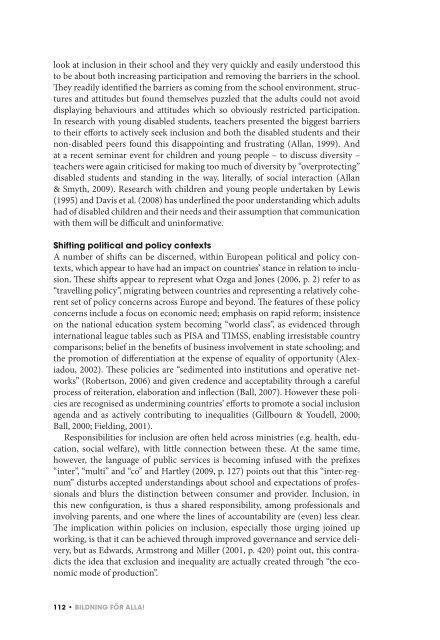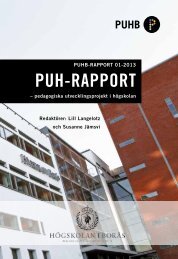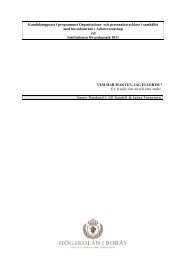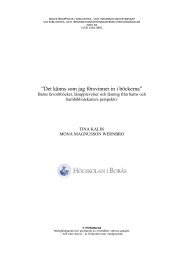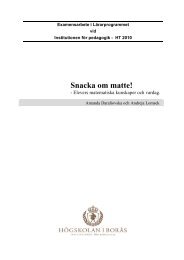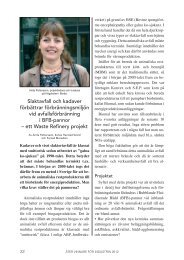Bildning för alla! - DiVA
Bildning för alla! - DiVA
Bildning för alla! - DiVA
Create successful ePaper yourself
Turn your PDF publications into a flip-book with our unique Google optimized e-Paper software.
look at inclusion in their school and they very quickly and easily understood this<br />
to be about both increasing participation and removing the barriers in the school.<br />
They readily identified the barriers as coming from the school environment, structures<br />
and attitudes but found themselves puzzled that the adults could not avoid<br />
displaying behaviours and attitudes which so obviously restricted participation.<br />
In research with young disabled students, teachers presented the biggest barriers<br />
to their efforts to actively seek inclusion and both the disabled students and their<br />
non-disabled peers found this disappointing and frustrating (Allan, 1999). And<br />
at a recent seminar event for children and young people – to discuss diversity –<br />
teachers were again criticised for making too much of diversity by “overprotecting”<br />
disabled students and standing in the way, literally, of social interaction (Allan<br />
& Smyth, 2009). Research with children and young people undertaken by Lewis<br />
(1995) and Davis et al. (2008) has underlined the poor understanding which adults<br />
had of disabled children and their needs and their assumption that communication<br />
with them will be difficult and uninformative.<br />
Shifting political and policy contexts<br />
A number of shifts can be discerned, within European political and policy contexts,<br />
which appear to have had an impact on countries’ stance in relation to inclusion.<br />
These shifts appear to represent what Ozga and Jones (2006, p. 2) refer to as<br />
“travelling policy”, migrating between countries and representing a relatively coherent<br />
set of policy concerns across Europe and beyond. The features of these policy<br />
concerns include a focus on economic need; emphasis on rapid reform; insistence<br />
on the national education system becoming “world class”, as evidenced through<br />
international league tables such as PISA and TIMSS, enabling irresistable country<br />
comparisons; belief in the benefits of business involvement in state schooling; and<br />
the promotion of differentiation at the expense of equality of opportunity (Alexiadou,<br />
2002). These policies are “sedimented into institutions and operative networks”<br />
(Robertson, 2006) and given credence and acceptability through a careful<br />
process of reiteration, elaboration and inflection (Ball, 2007). However these policies<br />
are recognised as undermining countries’ efforts to promote a social inclusion<br />
agenda and as actively contributing to inequalities (Gillbourn & Youdell, 2000;<br />
Ball, 2000; Fielding, 2001).<br />
Responsibilities for inclusion are often held across ministries (e.g. health, education,<br />
social welfare), with little connection between these. At the same time,<br />
however, the language of public services is becoming infused with the prefixes<br />
“inter”, “multi” and “co” and Hartley (2009, p. 127) points out that this “inter-regnum”<br />
disturbs accepted understandings about school and expectations of professionals<br />
and blurs the distinction between consumer and provider. Inclusion, in<br />
this new configuration, is thus a shared responsibility, among professionals and<br />
involving parents, and one where the lines of accountability are (even) less clear.<br />
The implication within policies on inclusion, especially those urging joined up<br />
working, is that it can be achieved through improved governance and service delivery,<br />
but as Edwards, Armstrong and Miller (2001, p. 420) point out, this contradicts<br />
the idea that exclusion and inequality are actually created through “the economic<br />
mode of production”.<br />
112 • BilDning fÖr AllA!


